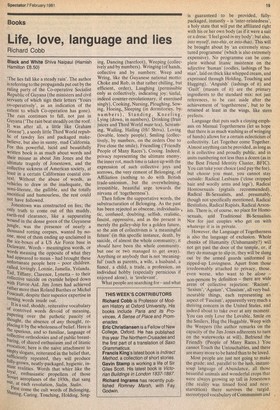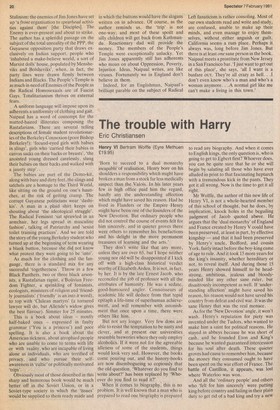Books
Life, love, language and lies
Richard Cobb
Black and White Shiva Naipaul (Hamish Hamilton £850) The lies fall like a steady rain'. The author is referring to the propaganda put out by the ruling party of the Co-operative Socialist Republic of Guyana (the ministers and civil servants of which sign their letters 'Yours co-operatively', as an indication of the extent to which Co-operation has gone). i The rain continues to fall, not just n Guyana (`The rain beat steadily on the roof. It was after all, a little like Graham Greene'), a seedy little Third World republic of tawdry lies and packaged makebelieve, but also in sunny, mad California. For this powerful, lucid and beautifully written book is as much about words and their misuse as abOut Jim Jones and the Ultimate tragedy of Jonestown, and the collective sickness of American society, at least in a certain Californian coastal context. Without the abuse of words, as vehicles to draw in the inadequate, the semi-literate, the gullible, and the totally uncritical and humourless, the rest could not have followed.
Jonestown was constructed on lies; the only truth to come out of this muddy, earth-red clearance, like a suppurating Nyound in the dense green of the Guyanese Jungle, was the presence of nearly a thousand rotting corpses, wanted by noone, most of them ending up unclaimed in the ice-boxes of a US Air Force base in Delaware. Words — meaningless words, or words meaning the opposite of what they had appeared to mean — had brought these unfortunate people here — poor children. called, lovingly, Lonnie, Jamelia, Yolanda, Tad, Tiffany, Clarence, Lynetta — to their collective suicide on cyanide helped down With Flavor-Aid. Jim Jones had achieved rather more than Roland Barthes or Michel Foucault, despite their superior expertise in turning words inside out. It is a sad, shoddy, reiterative vocabulary of contrived words devoid of meaning, PaPering over the pathetic paucity of thought, the absence of any thought, replacing it by the wholeness of belief. Here is the spurious, and so familiar, language of collective orthodoxies and of public breastutinh, of shared enthusiasm and of litanic evocation; here is the naive attachment to efilliry slogans, reiterated in the belief that. s.ufficiently repeated, they will produce tullY-grown, neatly-packaged, hygienic, in ant realities. Words that whirr like the 1„°Ya.1, enthusiastic propellers of those oviet aeroplanes of the 1930s, that sang °lit> at each revolution, Stalin, Stalin. c, First come the cult words of Belonging, °haring, Caring, Touching, Holding, Sing ing, Dancing (barefoot), Weeping (collecively and by numbers). Wringing (of hands, collective and by numbers: Weep and Wring, like the Guyanese national motto: Choke and Rob, in that rather chilling, but efficient, order), Laughing (permissible only as collectively, indicating joy; Sinful, indeed counter-revolutionary, if exercised singly), Cooking, Nursing, Ploughing, Sowing, Hoeing,. Sleeping (in dormitories, by numbers), Standing, Kneeling, Lying (down, in numbers), Drinking (fruit juices and Third World mate tea), Scream-' ing, Wailing, Hailing (Hi! Shiva), Loving (lovable, lonely people), Smiling (collectively, by numbers, on the orders One to Five close the smile), Friendling (`Friendly People of Many Races'), Cooing. Indeed, privacy representing the ultimate enemy, the inner rot, much time is taken up with the expression of such collective joys and sorrows, the very cement of Belonging, of Affiliation (nothing to do with British trade-unionism, but the overwhelming, irresistible, beautiful urge towards the nirvana of *togetherness').
Then follow the supportative words, the substructuration of Belonging. As the past has been rejected as obscene, individualistic, confused, doubting, selfish, realistic, fascist, oppressive, and as the present is merely the galley-ship for a golden future, so the aim of collectivism is 'a meaningful future' (in this specific instance, death, by suicide, of almost the whole community; it should have been the whole community, but one or twb managed to get away). Anything or anybody that is not 'meaningful' (such as parents, a wife, a husband, a fiancé, a child, a trade, a profession, an individual hobby (especially pernicious if enjoyed alone), is 'irrelevant'.
What people are searching for — and what is guaranteed to be provided, fullypackaged, instantly — is 'inter-relatedness', a holy state that will put the affiliated right with his or her own body (as if it were a suit or a dress: feel good in my body': but also, into myself, into-this, or into-thai). This will be brought about by 'an extremely structured programme' (which is also extremely expensive). No programme can be complete without litanic insistence on the adjective 'human' (oodles, lashings of 'human', laid on thick like whipped cream, and expressed through Holding, Touching and Hugging). 'Anguish' (lashings of it) and 'Guilt' (masses of it) are the primary ingredients to the standard mix: not just references, to be cast aside after the achievement of 'togetherness', but to be retained at least in the wings, like stern prefects.
Language that puts such a cloying emphasis on Manual Togetherness (let us hope that there is as much washing as of wringing of hands) allows for a certain eclecticism of collectivity. Let Together come Together. Almost anything can be provided, as long as it is collective and proudly public, and in units numbering not less than a dozen (as in the Best Friend Identity Cluster, BFIC). You can take your choice (and pay the fee), but choose you must, you cannot stay outside: Radical Lesbians ('close cropped hair and woolly arms and legs'), Radical Homosexuals (pigtails recommended), Radical Bi-Sexualists, and, presumably, though not specifically mentioned, Radical Bestialists, Radical Rapists, Radical Arsonists. There is, of course, no place for Homosexuals, and Traditional Bi-Sexualists. Nor for just couples who get on with whatever it is in private.
However, the Language of Togetherness is also the language of exclusion. Whole chunks of Humanity (Unhumanity?) will not get past the door of the temple, or, if they do manage to slip in, they will be slung out by the armed guards uniformed in zipped-up Lovingness. Apart from those irredeemably attached to privacy, those, even worse, who want to be alone — non-persons by definition — there are wide areas of collective rejection: 'Racism', 'Sexism', 'Ageism', GClassism', all very bad, incurable things, each representing an aspect of 'Fascism', apparently very much a thriving concern in the United States, and indeed about to take over at any moment. You can only Love the Lovable, Smile on the Smilers, Hug the Huggable, Weep with the Weepers (the author remarks on the capacity of the Jim Jones adherents to turn on the waterworks at will), Befriend the Friendly (People of Many Races.) You cannot Touch the Untouchables, and there are many more to be hated than to be loved.
Most people are just not going to make the grade; and, parallel to the lush, instantsoup language of Abundance, all those beautiful animals and wonderful crops that were always growing up tall in Jonestown (the reality was tinned food and nearstarvation) there survives the turgid, stereotyped vocabulary of Communism and , Stalinism: the enemies of Jim Jones have set up 'a front organisation to spearhead activities against them' ithe Disciples]. The Enemy is ever-present and about to strike. The author has a splendid passage on the subject of the total unreality of the PPP, the Guyanese opposition party that draws exclusively on Indian support, people who 'inhabited a make-believe world, a sort of Marxist dolls' house, populated by Mensheviks and Bolsheviks', when, in fact, the party lines were drawn firmly between Indians and Blacks. The People's Temple is as much in need of Enemies of the People as the Radical Homosexuals are of Fascist Gays. Totalitarianism thrives on external fears.
A uniform language will impose upon its adherents a uniformity of clothing and gait. Naipaul has a word of contempt for the matted-haired illiterates composing the Rastafarians. There are several telling descriptions of female student revolutionaries of the Berkeley Connexion (poor Bishop Berkeley!): 'fecund-eyed girls with babies in slings', girls who 'carried their babies in canvas sacks on their backs or breasts', 'the anointed young dressed carelessly, slung their babies on their backs and walked with a jaunty step'.
The babies are part of the Demo-kit, along with bare and dirty feet, the slings and satchels are a homage to the Third World, like sitting on the ground on one's haunches, at the risk of getting cramp. The corrupt Guyanese politicians wear 'dashikis'. A man in a plaid shirt keeps on shouting about 'the ideological struggle'. The Radical Feminist 'sat sprawled in an armchair, her legs spread in masculine fashion', talking of Patriarchy and 'sexist toilet training practices'. And we are told the story of the young Berkeley student who turned up at the beginning of term wearing a blank button, because she dicl not know what protest they were going to be 'into'.
As much for the clothing and the language, there is a standard mix for any successful 'togetherness'. Throw in a few Black Panthers, two or three black arsonists, a Rastafarian rapist, a-Bolivian Freedom 'Fighter, a sprinkling of feminists, ecologists, ministers of religion and 'friendly journalists' ('friendly' is an intoit word), to top with 'Chilean martyrs' (a tortured lawyer will do, but Allende's widow gives the best flavour). Simmer for 25 minutes.
This is a book about ideas mostly half-baked ones expressed in faulty grammar (`You is a princess') and poor spelling. It is also a book about the American sickness, about atrophied people who are unable to come to terms with life or with reality, who are incapable of living alone as individuals, who are terrified of privacy, and who pursue their selfawareness in 'cultic' or politically motivated 'trips'.
Obviously most of those described in this sharp and humorous book would be much better off in the Soviet Union, or in a Soviet-type society in which the 'issues' 'would be supplied to them ready made and in which the buttons would have the slogans written on in advance. Of course, as the author reminds us, the 'trip' is not one-way; and most of these spoilt and silly children will get back from Kathmandu. Reactionary dad will provide the money. The members of the People's Temple were exceptionally unlucky. Yet Jim Jones apparently still has adherents who moan on about Oppression, Poverty, Injustice. Ideas, Naipaul writes, are like viruses. Fortunately we in England don't believe in them.
Indeed, for an Englishman, Naipaul's brilliaut parable on the subject of Radical Left fanaticism is rather consoling. Most of our own students read and write and study, are confused, unable to make up their minds, and even manage to enjoy themselves, without either anguish or guilt. California seems a rum place. Perhaps it always was, long before Jim Jones. But there is at least one sane person in the book. Naipaul meets a prostitute from New Jersey in a San Francisco bar. 'I just want to get out of this place, she says, 'all I want is a busfare OUT. They're all crazy as hell. . don't even know who's a man and who's a woman anymore. .A normal girl like me can't make a living in this town.'







































 Previous page
Previous page